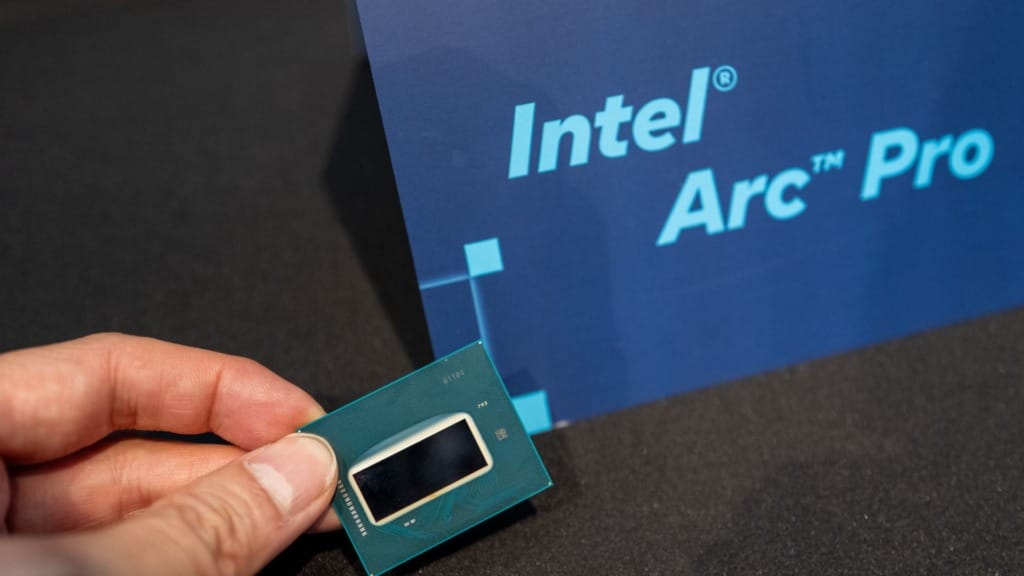Intel steps up Arc Pro series to rival NVIDIA and AMD in AI workstations
Intel expands the Arc Pro GPU series at Computex 2025, targeting enterprise AI needs with powerful, flexible, cost-effective solutions.

Intel has boldly moved at Computex 2025 by expanding its Arc Pro graphics card lineup, aiming to rival industry leaders NVIDIA and AMD. This step reflects the growing demand for powerful workstations that handle artificial intelligence (AI) and professional visual tasks. With this latest announcement, Intel positions itself as a serious contender in the enterprise AI space.
Table Of Content
New Arc Pro B60 is designed for powerful AI workloads
At the centre of Intel’s announcement is the Arc Pro B60, a new graphics card built for demanding AI tasks in business settings. It runs on Intel’s latest Battle Range architecture, which focuses on combining high performance with cost efficiency. The B60 features 24GB of video memory, but when used in a multi-GPU setup, you can pool memory across cards to reach an impressive 192GB. This is enough to handle AI models with up to 70 billion parameters.
What helps the B60 stand out is Intel’s xMEX engine, which improves memory management and reduces delays during AI inference tasks. Paired with Intel’s latest Xeon CPUs and support for PCIe 5.0, the B60 is built to deliver strong performance. According to Intel, it can outperform NVIDIA’s RTX A1000 by up to 50% in certain AI workloads.
Another key benefit is flexibility. Intel plans to offer the B60 in various form factors through its board partners. Unlike NVIDIA’s fixed design approach, this gives system builders more freedom to create solutions tailored to different needs and work environments.
AI-powered debugging to save time and reduce costs
One of the most exciting parts of Intel’s presentation was its new AI-powered debugging tools. Usually, tracking down problems in AI models is a long and complex job that can take senior engineers’ days to fix. Intel’s new method uses a group of AI agents—covering triage, debugging, design, and testing—to cut this process down to just a few hours.
This approach fits into Intel’s vision for Inference Workstations. These machines are designed to run powerful AI processes locally without relying on cloud services. That means lower latency, better data security, and reduced operating costs—all important factors for businesses working with sensitive or large amounts of data.
To help with this, Intel has bundled in container-based software like IPEX and OneAPI. These tools offer a full, scalable solution for running large language models and other AI tasks.
Roadmap, partnerships, and pricing
Intel’s plans don’t stop with the hardware. The company revealed a detailed software roadmap for the Arc Pro series throughout 2025:
- Q2 2025: Launch of baseline drivers for Windows and Linux to support testing and early use.
- Q3 2025: Certification for workstations and early-stage deployments of containerised systems.
- Q4 2025: Virtualisation improvements, including support for SRV, and more advanced management tools.
To support its hardware rollout, Intel is also working with seven leading system integrators, who are currently testing both the Arc Pro B50 and B60 models. Full systems are expected to launch in Q3 2025. Depending on the build, pricing is expected to fall between S$5,000 and S$10,000.

Intel also hinted at an edge-optimised version of the Arc Pro series due later this year, aiming to expand beyond the traditional GPU market.
Intel’s latest strategy shows it isn’t just dipping a toe into the GPU market – it’s diving in with a plan. With the Arc Pro B60, it’s clear Intel wants to offer something different: strong performance, flexible setups, local AI capabilities, and a lower total cost of ownership.
Intel addresses key worries around cloud-based AI, such as data privacy, reliability, and cost, by focusing on on-site processing. If Intel delivers on its promises, its Arc Pro lineup could become a real competitor in the AI workstation market and put real pressure on NVIDIA and AMD.
















